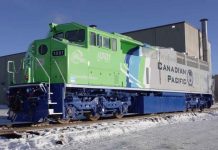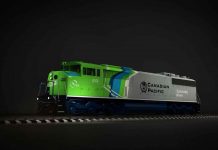 Province Moving Forward with Concept Design Work for Hydrogen-Powered Trains
Province Moving Forward with Concept Design Work for Hydrogen-Powered Trains
Steven Del Duca, Minister of Transportation, delivered a keynote address today to more than 200 industry leaders and international experts in the fuel cell technology and transportation sectors, who are at the Hydrail in Ontario symposium to examine the potential application of hydrogen fuel cell technology to electrify the GO rail network.
The province is also moving forward with concept design work and has now closed a request for proposals to show how a hydrogen fuel cell system could be integrated into a bi-level GO train.
Recent advances in the use of hydrogen fuel cells to power electric trains in other jurisdictions make it important that Ontario considers this clean electric technology as an alternative to conventional overhead wires. The Hydrogen Rail (Hydrail) Feasibility Study will help to inform whether hydrogen power can play a role in Ontario’s ongoing work to electrify GO rail.
Electrifying the GO rail network is part of the largest rail project in Canada as Ontario transforms GO from a commuter transit system to a regional rapid transit system. Weekly trips across the entire GO rail network will grow from about 1,500 to nearly 6,000 by 2025, with more two-way, all-day and 15-minute service for commuters and families across the region.
The first mention of hydrogen-powered rail in Ontario was in Thunder Bay when then Premier Dalton McGuinty raised the topic stating that the province had entered into talks with Bombardier. This was in 2007. At that time, it later became seen more as a campaign promise as for years later there was no apparent effort. The issue of hydrogen-powered rail has continued over the time sine that the first promise.

That promise was a fairly simple one; “The hydrogen commuter train is exactly the type of initiative envisioned when the Ontario Liberal government created the new $650 million Next Generation Jobs Fund, McGuinty said. Ontario Liberals want to expand the Fund by a further $500 million after the October 10th election.
“Ontario Liberals think Ontarians can – and should – lead the development of hydrogen alternatives for the world,” McGuinty said.
Quick Facts
- Ontario is investing $21.3 billion to transform GO Transit from a commuter transit service to a regional rapid transit system.
- Since 2015, GO Transit service enhancements and station improvements include the new West Harbour GO Station, new midday service between Brampton and Toronto, the new Gormley GO Station, Barrie weekend service, new all-day Stouffville weekday service, and the new Oshawa GO Station.
- The Hydrail Feasibility Study is anticipated to be complete by the end of 2017, with a decision on electrification technology to follow.
- A Request for Proposals closed on Nov. 9 seeking concept design work to show how a hydrogen fuel cell system could be integrated into a Bi-level Electric Multiple Unit (EMU) train.
- An EMU train is an electric-powered train consisting of multiple self-propelled carriages linked together. An EMU does not require a separate locomotive, as electric motors are incorporated in each carriage. Examples of EMUs currently in service include the Heathrow Flyer in the UK, the AGV in France and the TTC’s Toronto Rocket subway trains.




